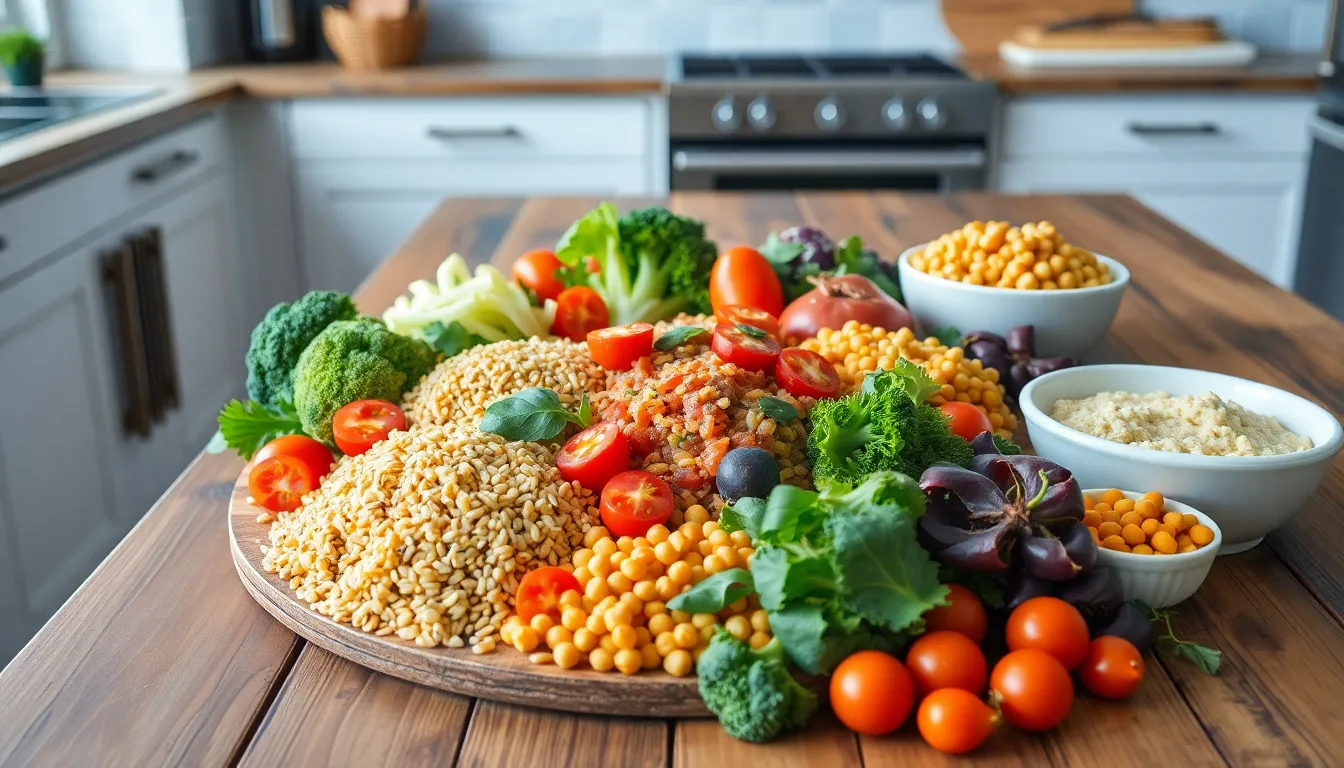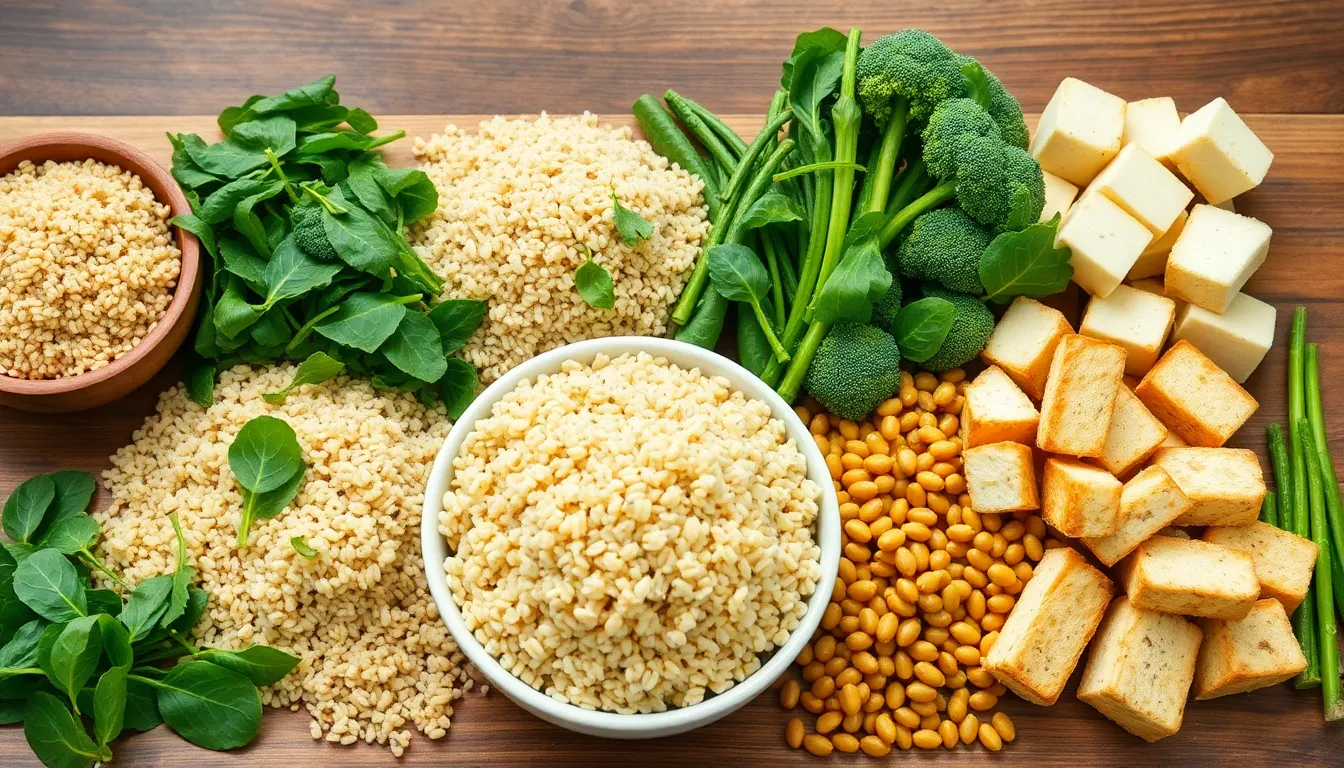Table of Contents
ToggleImagine a world where losing weight doesn’t mean sacrificing flavor. It’s not a fantasy; it’s the magic of healthy vegetarian recipes! Packed with vibrant veggies, hearty grains, and zesty spices, these dishes can turn any meal into a guilt-free feast. Who knew that shedding pounds could be this delicious?
Benefits Of Healthy Vegetarian Recipes For Weight Loss
Healthy vegetarian recipes offer numerous advantages for those focused on losing weight. These meals not only taste great but also provide essential nutrients that support overall well-being.
Nutritional Advantages
Vegetarian recipes emphasize whole ingredients, ensuring the body receives a wide array of vitamins and minerals. Colorful vegetables and whole grains deliver fiber, promoting digestive health and keeping individuals full longer. Antioxidants found in plant-based foods contribute to reduced inflammation, supporting metabolic health. Nutritionally dense options like legumes, nuts, and seeds add proteins, helping retain muscle mass during weight loss. Incorporating healthy fats from avocados and olive oil can enhance satiety, making it easier to resist unhealthy snacking.
Weight Management
Promoting weight loss, vegetarian recipes consist of lower-calorie but filling ingredients. Meals rich in fiber slow digestion, which aids in appetite control. Regularly preparing these meals encourages portion control, leading to sustained weight management. Choosing vegetarian recipes often results in fewer added sugars and unhealthy fats compared to traditional meals. Plant-based diets also contribute to a healthier body composition, as studies indicate they often result in lower body mass index (BMI) over time. By focusing on these elements, individuals can create a sustainable approach to weight loss.
Ingredients To Focus On


Focusing on specific ingredients enhances the effectiveness of healthy vegetarian recipes for weight loss. Prioritizing the following key components can create nutritious and satisfying meals.
Whole Grains
Whole grains serve as a vital source of nutrients and fiber. They promote satiety and reduce overeating, making them a great choice for weight loss. Options like quinoa, brown rice, and barley provide essential vitamins and minerals. Incorporating whole grains into meals boosts energy levels while helping regulate blood sugar. These ingredients also contribute to heart health, offering protective benefits against cardiovascular disease.
Fresh Vegetables
Fresh vegetables should form the foundation of any vegetarian recipe aimed at weight loss. They contain low calories and high water content, which aids in feeling full. Diverse choices, such as spinach, broccoli, and bell peppers, deliver a wealth of vitamins and antioxidants. Adding a colorful array of vegetables enhances visual appeal and nutritional variety. Regularly including fresh vegetables in daily meals supports overall health and aids digestion.
Plant-Based Proteins
Plant-based proteins play a crucial role in building and maintaining muscle while assisting with weight loss. High-protein foods like lentils, chickpeas, and tofu are excellent for promoting satiety. Incorporating these ingredients into meals can help balance blood sugar and enhance metabolism. Choices like edamame and tempeh offer additional protein sources while introducing diverse flavors to dishes. Practicing a plant-centered approach to protein consumption fosters sustainable weight management.
Delicious Healthy Vegetarian Recipes
Healthy vegetarian recipes offer flavorful options that support weight loss while satisfying taste buds. Each meal features wholesome ingredients and provides essential nutrients.
Breakfast Options
Start the day with a veggie-packed smoothie. A blend of spinach, banana, and almond milk delivers a nutrient-rich boost. Overnight oats topped with berries and chia seeds offer fiber and antioxidants. Another option includes avocado toast on whole-grain bread, enriched with tomatoes and a sprinkle of salt. Each breakfast choice enhances satiety and provides energy for the day ahead.
Lunch Ideas
Salads can be both nutritious and filling. Combine quinoa, chickpeas, and mixed greens for a balanced lunch. These ingredients promote fullness and supply protein. Wraps filled with hummus, cucumbers, and bell peppers also serve as tasty options. Couscous with roasted vegetables adds delicious variety to lunchtime meals. Each dish caters to hunger while remaining calorie-conscious.
Dinner Dishes
For dinner, stir-fries made with tofu and colorful vegetables shine. This combination presents a satisfying protein source alongside essential nutrients. Vegetable curry is another choice, offering complex flavors and wholesome ingredients. A hearty lentil soup not only warms but also satisfies hunger with its high fiber content. Each dish creates a fulfilling end to the day.
Snacks And Sides
Healthy snacks can support weight loss goals. Fresh fruits and vegetables provide low-calorie, nutrient-dense options. Carrot sticks with hummus offer crunch and protein in a satisfying mix. Air-popped popcorn seasoned with herbs serves as a light yet tasty treat. Roasted chickpeas provide crunch along with protein and fiber. Each snack contributes to balanced eating.
Tips For Incorporating Vegetarian Recipes Into Your Diet
Incorporating healthy vegetarian recipes into daily meals requires planning and mindfulness. Strategies include meal planning and practicing portion control.
Meal Planning
Planning meals in advance simplifies the process of maintaining a vegetarian diet. Choosing a specific day each week to prepare meals can set a solid routine. Create a diverse menu that includes various fresh vegetables, whole grains, and plant-based proteins to ensure nutritional balance. Shopping with a list prevents impulse buys and encourages purchasing healthy ingredients. Furthermore, batch cooking can save time and effort during busy weeks, ensuring easy access to nutritious meals. Using recipes that freeze well, like soups or stews, makes it simple to have wholesome options ready when needed.
Portion Control
Practicing portion control aids in managing calorie intake while enjoying vegetarian meals. Using smaller plates minimizes serving sizes, helping individuals avoid overeating. Measuring serving sizes for grains and proteins ensures they remain within recommended limits. Eating mindfully by focusing on food textures and flavors can enhance satisfaction, leading to better overall satiety. Additionally, filling half the plate with vegetables takes advantage of their low calorie density while promoting nutrient intake. Keeping snacks in single-serving portions further aids in maintaining control throughout the day.







